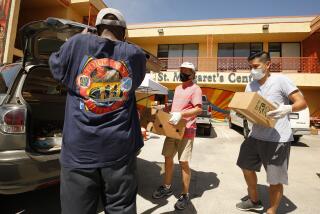Rotarian Helps Heal Children
- Share via
A 13-minute videotape shown at a Rotary Club meeting changed Ursula Blazej’s life.
The 49-year-old Van Nuys resident first heard about Rotaplast International last summer. The volunteer organization performs surgeries on South American children deformed by cleft lip or palate.
“I can’t explain it,” Blazej said recently. “[The video] just grabbed me.” Moved by the video’s scenes of disfigured children, Blazej was soon driving to the organization’s headquarters in San Francisco to see how she could help. Although she had no medical training, she was determined.
“I don’t know what happened,” she recalls. “I just knew I had to be involved.”
Rotaplast--which stands for Rotary Plastic Surgery--was created in 1991 by the Rotary Club of San Francisco to provide free reconstructive surgery to indigent children born with cleft lip, cleft palate and other facial deformities.
The organization began when a Rotarian and his wife saw the need for such surgeries after visiting Chile during the adoption of their daughter.
Rotaplast started small by donating medical equipment and supplies to hospitals in Santiago, Chile. Since 1993, the organization has conducted more than 2,700 surgeries on 24 medical missions to South America, where the incidence of cleft lip and palate is twice as high as in the United States.
Geneticists believe the higher frequency may be due to poor diet, genetics, the environment and a lack of folic acid during pregnancy, said Rotaplast Executive Director Anita Stangl.
Cleft lip and palate are congenital defects that occur early in fetal development, usually six weeks after conception. A cleft lip is a separation of the two sides of the lip. A cleft palate is an opening in the roof of the mouth that occurs when the two sides of the palate do not fuse. Some children have both disorders.
Rotaplast medical teams are made up of volunteer plastic surgeons, pediatricians, nurses and nonmedical Rotarian volunteers from around the country.
Blazej, a mother of three who works as a bookkeeper for her husband’s Sun Valley auto repair shop, took a half-day training course conducted by Rotaplast executives. In February, she served as a medical records keeper on a 17-day mission to Cochabamba, Bolivia.
“There were close to 300 families there waiting for us in a line in front of the clinic,” she said. “It was overwhelming.”
Blazej and another volunteer took information from each of the families to create a file for the medical team. They did their best to get over the language barrier. She learned that some families had traveled 30 hours on a bus with hungry and thirsty children.
“They never once complained,” she said.
The families had learned about Rotaplast’s mission through word of mouth and radio. Many were dressed in their “Sunday best,” Blazej said. Mothers cradled disfigured babies--as young as 3 months old--in brightly colored shawls. Teenagers also were seen by the doctors, as were a handful of adults.
Repairing cleft lip and palate is critical because the children face a host of medical problems such as pneumonia, malnutrition, infection and hearing loss. But worst of all, they and their families face isolation and rejection in their communities because of the deformities.
Superstitions that the children are somehow evil are common, especially in small villages. Some children are nameless and others are abandoned by their parents.
With a relatively quick $500 surgery, the children and their families are given a new life.
“This is a miracle for these families,” Blazej said. “The parents are stunned to see their children for the first time with a healed face.”
Blazej knows firsthand the emotion in the recovery room. In addition to maintaining files on each child, she served as a recovery nurse, assisting parents, drying tears and cuddling children after surgery, which lasted between 1 1/2 and four hours.
“I’m just a mother,” Blazej said. “If I could help the child feel comfortable, I did.”
The 32-person team completed 62 operations working six days a week, some up to 15 hours a day.
Now back home, Blazej is working to raise funds speaking at Rotary clubs throughout the Southwest about her experience. She knows she can convince others to help. She hopes to raise $50,000--the typical cost of a mission--to take a Southern California contingent back to Cochabamba next February for follow-up treatments.
She also wants doctors to see the 100 or so children that had to be turned away because of time constraints.
“I’m ready to go back any day,” she said. “The need of the children keeps me going. We are their only hope.”
Rotaplast International Inc. can be reached at (415) 538-8120 or by e-mail at atstangl@aol.com. Local donations can be sent to the Sun Valley Rotary, P.O. Box 324, Sun Valley, CA 91352-0324.
*
Personal Best is a weekly profile of an ordinary person who does extraordinary things. Please send suggestions on prospective candidates to Personal Best, Los Angeles Times, 20000 Prairie St., Chatsworth 91311. Or fax them to (818) 772-3338. Or e-mail them to valley.news@latimes.com.
More to Read
Sign up for Essential California
The most important California stories and recommendations in your inbox every morning.
You may occasionally receive promotional content from the Los Angeles Times.













